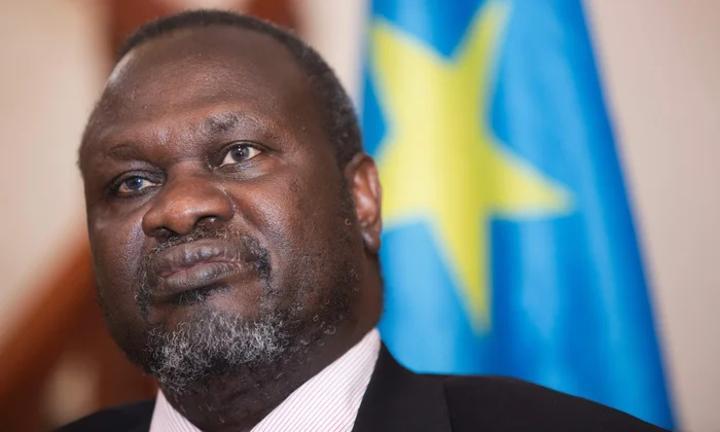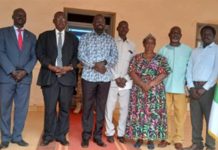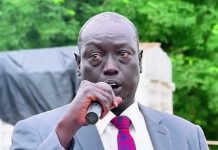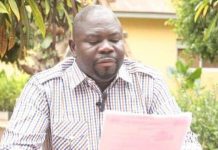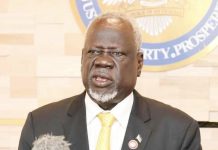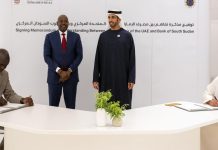MADING PETER ANGONG
Africa-Press – South-Sudan. South Sudan’s political landscape has long been a battlefield of narratives, with each side wielding history as both sword and shield. The recent detention of First Vice President Dr. Riek Machar has once again divided opinion, drawing passionate arguments from respected citizens such as Samuel Peter Oyay and Dr. Sunday de John. Their writings speak to the deep polarisation that has gripped our country since independence — a polarisation that risks eroding both the rule of law and our fragile national cohesion.
Samuel Peter Oyay warns that framing Dr. Machar’s detention as “criminal” rather than “political” undermines the state’s legitimacy and bypasses the agreed political mechanisms of the 2018 peace deal. He argues that the law requires due process — charge, trial, defence — and that anything less turns South Sudan into a security state where political disputes are settled by force, not dialogue. His perspective is rooted in the belief that sustainable peace can only be built on the principles of inclusion, respect for agreements, and the rule of law.
Dr. Sunday de John, on the other hand, focuses on the heavy weight of history. To him, Dr. Machar is not just another political actor but a man whose legacy is stained with the blood of innocent South Sudanese — from the Bor massacre of 1991 to the recurring cycles of rebellion. He sees the detention as an act of national self-defence, necessary to prevent history from repeating itself. For Dr. Sunday, justice must not be sacrificed at the altar of political compromise, and accountability must reach even the most powerful.
Both arguments have merit. Samuel Peter Oyay is right to insist that justice must follow due process. Without a fair and transparent trial, detention risks becoming a political weapon, further deepening mistrust among communities and undermining the peace agreement’s credibility. Dr. Sunday de John is equally correct that the horrors of the past cannot be ignored — and that impunity, especially for those with the means to destabilize the country, invites disaster.
The problem is that each side treats justice and politics as though they exist in separate rooms. In reality, in a post-conflict society like ours, the two are intertwined. Political stability cannot be achieved without justice, and justice cannot be seen as legitimate if it is perceived to be politically motivated.
A reconciliatory path is possible — but it requires political maturity and institutional courage. First, Dr. Machar should either be promptly charged and tried in a transparent, independent court or released to fully participate in the political process. This addresses Samuel’s concern for due process while also responding to Dr. Sunday’s demand for accountability. Second, if crimes are proven, the punishment must be lawful and proportionate, sending a clear message that no leader is above the law. Third, our political leaders must commit to insulating the judiciary from political interference, so that future cases — against anyone — are decided by evidence, not alliances.
There is also room for a third alternative: a hybrid justice mechanism that combines judicial accountability with truth and reconciliation, similar to South Africa’s Truth and Reconciliation Commission or Rwanda’s National Unity and Reconciliation Commission. South Sudan’s Peace Agreement of 2018 includes a chapter on transitional justice, which sets out three mechanisms: A Hybrid Court, a Truth and Reconciliation Commission (CTRH), and a Reparations Authority. While progress on the Hybrid Court is yet lacking, there has been some movement on the establishment of a Commission for Truth, Reconciliation, and Healing in 2022.
The Agreement specifies that the Truth Commission should include best practices for promoting truth, reconciliation, and healing from the African Continent and elsewhere, and that “the CTRH shall recommend processes for the full enjoyment by victims of the right to remedy, including by suggesting measures for reparations and compensation.” Such a process could allow victims to speak, perpetrators to account for their actions, and the nation to confront its violent past while still moving forward politically. This would neither excuse crimes nor weaponize justice, but instead anchor our future in a shared commitment to truth and healing.
South Sudan’s tragedy is that too often, political disputes are settled through violence or detention rather than through the institutions meant to serve all citizens equally. If we continue on this path, we risk building a republic where law bends to the will of the powerful, and where history’s wounds never truly heal.
Our challenge, therefore, is not to decide whether Dr. Machar is a politician or a criminal. Our challenge is to prove — to ourselves and the world — that South Sudan can uphold the rule of law while still pursuing political reconciliation. That is the mark of a mature nation. Anything less is a return to the politics of the gun.
Source: Radio Tamazuj
For More News And Analysis About South-Sudan Follow Africa-Press

